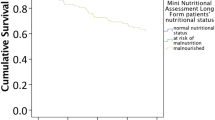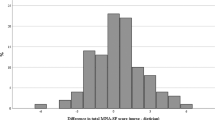Abstract
Background/Objectives:
Mini nutritional assessment (MNA) is the most frequently used screening test for malnutrition in elderly populations in continental Europe and Asia. Most studies on MNA’s ability to predict mortality have only included persons admitted to hospital, living in nursing homes or at home with professional help with activities of daily living. The aim of this cohort study was to examine if MNA can predict 10-year mortality in the general elderly female population.
Subjects/Methods:
Of the 584 free-living elderly women invited, 351 agreed to participate and were tested with MNA between 1999 and 2000. A 10-year follow-up was conducted in 2010 with dates of death obtained from the Swedish death register.
Results:
Participants whose MNA score was ⩽23.5 points at inclusion had a significantly higher age-adjusted 10-year mortality risk than participants with a MNA score of >23.5 points. The hazard ratio was 2.36 (95% confidence interval 1.25–4.46), P <0.01.
Conclusions:
Participants with a MNA score, indicating an increased risk for malnutrition, were more than twice as likely to die during the 10-year follow-up as participants whose MNA score indicated normal nutritional status. Hence, MNA can predict mortality in a general, free-living, elderly female population.
This is a preview of subscription content, access via your institution
Access options
Subscribe to this journal
Receive 12 print issues and online access
$259.00 per year
only $21.58 per issue
Buy this article
- Purchase on Springer Link
- Instant access to full article PDF
Prices may be subject to local taxes which are calculated during checkout

Similar content being viewed by others
References
Kaiser MJ, Bauer JM, Ramsch C, Uter W, Guigoz Y, Cederholm T et al. Frequency of malnutrition in older adults: a multinational perspective using the mini nutritional assessment. J Am Geriatr Soc 2010; 58: 1734–1738.
Christine AR . The impact of malnutrition on healthcare costs and economic considerations for the use of oral nutritional supplements. Clin Nutr Suppl 2007; 2: 25–32.
Constans T, Alix E, Dardaine V . Protein-energy malnutrition. Diagnostic methods and epidemiology. Presse Med 2000; 29: 2171–2176.
Milne AC, Potter J, Vivanti A, Avenell A . Protein and energy supplementation in elderly people at risk from malnutrition. Cochrane Database Syst Rev 2009, CD003288.
Salva A, Coll-Planas L, Bruce S, De Groot L, Andrieu S, Abellan G et al. Nutritional assessment of residents in long-term care facilities (LTCFs): recommendations of the task force on nutrition and ageing of the IAGG European region and the IANA. J Nutr Health Aging 2009; 13: 475–483.
Bauer JM, Kaiser MJ, Anthony P, Guigoz Y, Sieber CC . The mini nutritional assessment—its history, today's practice, and future perspectives. Nutr Clin Pract 2008; 23: 388–396.
Van Nes MC, Herrmann FR, Gold G, Michel JP, Rizzoli R . Does the mini nutritional assessment predict hospitalization outcomes in older people? Age Ageing 2001; 30: 221–226.
Kuikka LK, Salminen S, Ouwehand A, Gueimonde M, Strandberg TE, Finne-Soveri UH et al. Inflammation markers and malnutrition as risk factors for infections and impaired health-related quality of life among older nursing home residents. J Am Med Dir Assoc 2009; 10: 348–353.
Donini LM, De Felice MR, Savina C, Coletti C, Paolini M, Laviano A et al. Predicting the outcome of long-term care by clinical and functional indices: the role of nutritional status. J Nutr Health Aging 2011; 15: 586–592.
Saletti A, Johansson L, Yifter-Lindgren E, Wissing U, Osterberg K, Cederholm T . Nutritional status and a 3-year follow-up in elderly receiving support at home. Gerontology 2005; 51: 192–198.
Persson MD, Brismar KE, Katzarski KS, Nordenstrom J, Cederholm TE . Nutritional status using mini nutritional assessment and subjective global assessment predict mortality in geriatric patients. J Am Geriatr Soc 2002; 50: 1996–2002.
Tsai AC, Yang SF, Wang JY . Validation of population-specific mini-nutritional assessment with its long-term mortality-predicting ability: results of a population-based longitudinal 4-year study in Taiwan. Br J Nutr 2010; 104: 93–99.
Rubenstein LZ, Harker JO, Salva A, Guigoz Y, Vellas B . Screening for undernutrition in geriatric practice: developing the short-form mini-nutritional assessment (MNA-SF). J Gerontol A Biol Sci Med Sci 2001; 56: M366–M372.
Chan M, Lim YP, Ernest A, Tan TL . Nutritional assessment in an Asian nursing home and its association with mortality. J Nutr Health Aging 2010; 14: 23–28.
Tsai AC, Yang SF . The mini nutritional assessment (MNA) can predict long-term mortality and health status of elderly taiwanese. Ann Nutr Metab 2009; 55: 479.
Kagansky N, Berner Y, Koren-Morag N, Perelman L, Knobler H, Levy S . Poor nutritional habits are predictors of poor outcome in very old hospitalized patients. Am J Clin Nutr 2005; 82: 784–791.
Inoue K, Kato M . Usefulness of the mini-nutritional assessment (MNA) to evaluate the nutritional status of Japanese frail elderly under home care. Geriatr Gerontol Int 2007; 7: 238–244.
Cereda E, Pusani C, Limonta D, Vanotti A . The ability of the geriatric nutritional risk index to assess the nutritional status and predict the outcome of home-care resident elderly: a comparison with the mini nutritional assessment. Br J Nutr 2009; 102: 563–570.
Beck AM, Ovesen L, Schroll M . A six months’ prospective follow-up of 65+-y-old patients from general practice classified according to nutritional risk by the mini nutritional assessment. Eur J Clin Nutr 2001; 55: 1028–1033.
Payette H, Gray-Donald K, Cyr R, Boutier V . Predictors of dietary intake in a functionally dependent elderly population in the community. Am J Public Health 1995; 85: 677–683.
Beck AM, Ovesen L, Osler M . The ‘mini nutritional assessment’ (MNA) and the ‘determine your nutritional health’ checklist (NSI checklist) as predictors of morbidity and mortality in an elderly Danish population. Br J Nutr 1999; 81: 31–36.
Salminen H, Saaf M, Johansson SE, Ringertz H, Strender LE . Nutritional status, as determined by the mini-nutritional assessment, and osteoporosis: a cross-sectional study of an elderly female population. Eur J Clin Nutr 2006; 60: 486–493.
Guigoz Y VB, Garry PJ . Mini nutritonal assessment: a practical assessment tool for grading the nutrtional state of elderly patients. Facts Res Gerontol 1994; 4: 15–59.
Nestlé. MNA user guide. Nestlé Nutrition Institute, 2012; Available from: http://www.mna-elderly.com/mna_forms.html.
Hartigan I . A comparative review of the Katz ADL and the Barthel Index in assessing the activities of daily living of older people. Int J Older People Nurs 2007; 2: 204–212.
Espaulella J, Arnau A, Cubi D, Amblas J, Yanez A . Time-dependent prognostic factors of 6-month mortality in frail elderly patients admitted to post-acute care. Age Ageing 2007; 36: 407–413.
Vischer UM, Frangos E, Graf C, Gold G, Weiss L, Herrmann FR et al. The prognostic significance of malnutrition as assessed by the mini nutritional assessment (MNA) in older hospitalized patients with a heavy disease burden. Clin Nutr 2012; 31: 113–117.
Meijers JM, van Bokhorst-de van der Schueren MA, Schols JM, Soeters PB, Halfens RJ . Defining malnutrition: mission or mission impossible? Nutrition 2010; 26: 432–440.
Rockwood K, Song X, MacKnight C, Bergman H, Hogan D, McDowell I et al. A global clinical measure of fitness and frailty in elderly people. Gerontologist 2005; 45: 386.
Acknowledgements
This study and the PRIMOS project were funded by the Stockholm County Council, Sweden.
Author information
Authors and Affiliations
Corresponding author
Ethics declarations
Competing interests
The authors declare no conflict of interest.
Rights and permissions
About this article
Cite this article
Lundin, H., Sääf, M., Strender, LE. et al. Mini nutritional assessment and 10-year mortality in free-living elderly women: a prospective cohort study with 10-year follow-up. Eur J Clin Nutr 66, 1050–1053 (2012). https://doi.org/10.1038/ejcn.2012.100
Received:
Revised:
Accepted:
Published:
Issue Date:
DOI: https://doi.org/10.1038/ejcn.2012.100
Keywords
This article is cited by
-
Is the Utility of the GLIM Criteria Used to Diagnose Malnutrition Suitable for Bicultural Populations? Findings from Life and Living in Advanced Age Cohort Study in New Zealand (LiLACS NZ)
The journal of nutrition, health & aging (2023)
-
A non-invasive modifiable Healthy Ageing Nutrition Index (HANI) predicts longevity in free-living older Taiwanese
Scientific Reports (2018)
-
Survival in malnourished older patients receiving post-discharge nutritional support; long-term results of a randomized controlled trial
The Journal of nutrition, health and aging (2017)
-
Nutritional status and survival among old adults: an 11-year population-based longitudinal study
European Journal of Clinical Nutrition (2016)
-
Malnutrition, functional ability and mortality among older people aged ⩾60 years: a 7-year longitudinal study
European Journal of Clinical Nutrition (2016)



